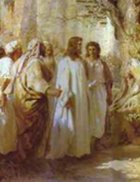The Divine Attributes of the Holy Spirit

.... In addition to direct references of the Holy Spirit’s deity, which we discussed earlier, the Divine attributes are equally ascribed to the Holy Spirit. In Hebrews 9:14 for example, He is referred to as an eternal being, when the Scriptures say that Jesus offered Himself up through the ‘eternal Spirit’. Also, the Holy Spirit is described as being omnipresent in Psalm 139:7-12 where David says, "Where may I go that I may hide from Your Spirit?" and he names all of the places he could perhaps have gone. But then he says, "But you’ll be there!" You’re omnipresent!
.... The Scriptures also teach that the Holy Spirit is omnipotent, or all powerful. Ephesians 2 speaks of the exceeding greatness of His power which He worked in Christ when He raised Him from the dead, and Romans 1:4 says that this power was the power of the Holy Spirit. The apostles were to wait in Jerusalem until they were endued with power from on high – that same power that raised Jesus from the dead. The Holy Spirit is omnipotent – His power is endless.
.... And finally the Holy Spirit is omniscient, which means that He knows all things. And the best passage for this is in 1 Corinthians 2:10-11. "The Holy Spirit searches all things, even the deep things of God." And how can anyone have a deeper understanding than that?
.... So we see through these quotations that the Divine qualities, first ascribed to the Father and to Jesus Christ, are also ascribed to the Holy Spirit, and that He, too, is referred to as ‘God’ (Acts 5:3-4). So what does this leave us with in Scripture, when we look at it all together?
.... There is only one God. God the Father is referred to as ‘God’ and He matches all of the Divine attributes; Jesus Christ is referred to as God, and He matches all of these Divine attributes as well; The Holy Spirit is referred to as God, and He, too, matches all of those Divine attributes.
.... Father and Son are shown to be of one essence. Father and Spirit are shown to be of one essence. Son and Spirit are shown to be of one essence, Indeed, they are only one God. But this one God exists in three personalities simultaneously: that of Father, Son and Holy Ghost. This is where the Doctrine of the Trinity comes along, and we’ll go over it one more time:
.... God is One in respect to essence; God is three in respect to personal distinctions; God is three in respect to His roles in the creative and redemptive process.
















0 Comments:
Post a Comment
<< Home